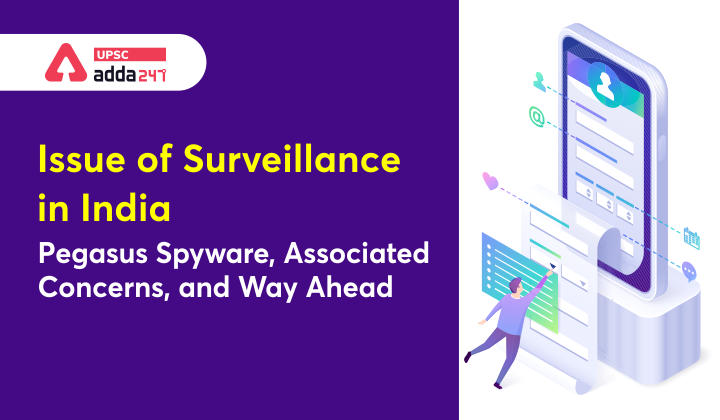Table of Contents
Relevance
- GS Paper 2: Government Policies & Interventions for development in various sectors and issues arising out of their design and implementation.
- GS Paper 3: Cyber Security, Cyber Warfare, and Challenges to Internal Security Through Communication Networks.

Get free video for UPSC CSE preparation and make your dream of becoming an IAS/IPS/IRS a reality
Context
- A global collaborative investigation project by many agencies has revealed that Israeli spyware Pegasus was used to target thousands of people across the world.
- In India, at least 300 people are believed to have been targeted.
- The government has denied this and claimed that all interception in India takes place lawfully.
Read more about Pegasus at-Pegasus Spyware
Laws related to surveillance in India
The laws authorizing interception and monitoring of communications are:
- Section 92 of the Criminal Procedure Code (CrPC)
- Telegraph Act, 1885: deals with interception of calls.
- Grounds for an interception as provided in section 5(2):
- Interests of the sovereignty and integrity of India,
- Security of the state,
- Friendly relations with foreign states or public order,
- Preventing incitement to the commission of an offence.
- Procedural safeguards provided under Rule 419A of telegraph Act: It says that a Secretary to the Government of India (not below the rank of a Joint Secretary) in the Ministry of Home Affairs can pass orders of interception in the case of Centre, and similar provisions exist at the state level.
- Grounds for an interception as provided in section 5(2):
- Information Technology Act, 2000: deals with surveillance of all electronic communication.
- Section 69 of the IT Act: has vague provisions and broader scope for conducting surveillance as the only requirement for engaging in electronic surveillance is for the “investigation of an offence”.
- Vague and broad provisions provide governments the opportunity to engage in illegal interception and monitoring activities.
Ozone Pollution: Causes, Impacts and Steps taken to Reduce Ozone Pollution
Associated concerns
- Violation of Fundamental Rights: The very existence of a surveillance system impacts the right to privacy (K.S. Puttaswamy judgment, 2017) and the exercise of freedom of speech (Article 19) and personal liberty (Art 21).
- Endangering the safety of journalists, civil society activists, leading to further decline of press freedom in India and the world.
- World Press Freedom Index has ranked India 142 out of 180 countries in 2021 (India’s ranked 133 in 2016).
- Issue of Mass surveillance: due to the advancement of technology, tools like spyware can be used by states to conduct mass surveillance rather than specific surveillance, endangering the very soul and essence of a democratic nation.
- Inadequate legislative safeguards: India is yet to enact a comprehensive data protection law to address the gaps in existing frameworks for surveillance.
- Lack of clarity regarding authorized agencies for conducting surveillance: creates a legal loophole that could be misused by security agencies to conduct illegal surveillance directed towards fulfilling some vested interests.
Insolvency and Bankruptcy Code (Amendment) Bill 2021
Supreme courts observations
- Public Union for Civil Liberties v Union of India (1996):
- The Supreme Court pointed out the lack of procedural safeguards in the provisions of the Telegraph Act and laid down certain guidelines for interceptions.
- Among the guidelines issued by the court were setting up a review committee that can look into authorizations made under Section 5(2) of the Telegraph Act.
- K.S. Puttaswamy judgment, 2017 regarding Surveillance:
- judgment laid down three tests that must be satisfied before violating individual privacy. They are-
- The restriction must be by law;
- It must be necessary (only if other means are not available) and proportionate (only as much as needed);
- It must promote a legitimate state interest (e.g., national security).
- The right to privacy is available against both state and non-state actors.
- The court stated that the Right to Privacy is an inherent and integral part of Part III of the Constitution that guarantees fundamental rights.
- judgment laid down three tests that must be satisfied before violating individual privacy. They are-
Way forward
- Personal Data Protection (PDP) Bill, 2019: must be extensively debated and discussed followed by its enactment by the Parliament to ensure comprehensive legal privacy safeguards in the country.
- Incorporate ethics of surveillance: should be included in India’s surveillance system which considers moral aspects for employing surveillance on individual citizens.
- Judicial oversight over surveillance systems: will act as a check on the surveillance activities of the executive, limiting its misuse by the government.
- Parliamentary oversight and scrutiny: should be provided over the functioning of various investigative authorities.
- Parliament through legislative action must also provide for a clear and comprehensive legal framework for the existence and functioning of various investigating agencies.
Also read- Prelims Specific Articles- 31 July 2021



 TSPSC Group 1 Question Paper 2024, Downl...
TSPSC Group 1 Question Paper 2024, Downl...
 TSPSC Group 1 Answer key 2024 Out, Downl...
TSPSC Group 1 Answer key 2024 Out, Downl...
 UPSC Prelims 2024 Question Paper, Downlo...
UPSC Prelims 2024 Question Paper, Downlo...




